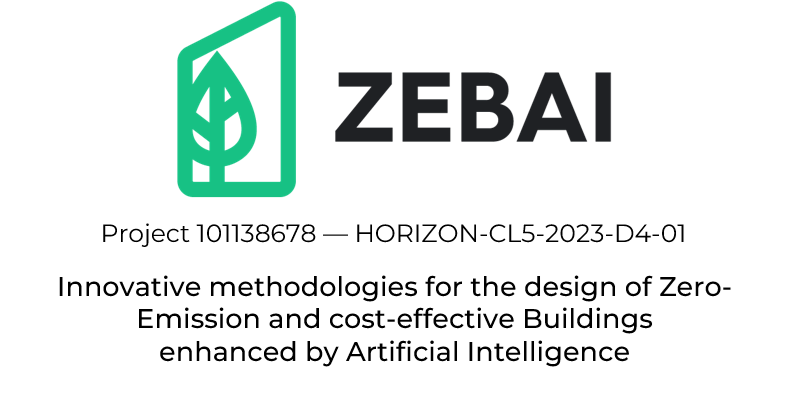- Financing entity
- Unión Europea: HORIZON-CL5-202-D4-01
- Duration
- Enero 2024 – Diciembre 2028
- Principal investigator(s)
- Gloria Pérez Álvarez-Quiñones
- Budget
- 4 468 763 € (CSIC: 478 794 €)
- Official web
ZEBAI is an ambitious project in which 18 partners from 7 different European countries collaborate, coordinated by the Polytechnic University of Madrid. The objective is to develop a new methodology for the design of zero-emission buildings, integrating all interdependent analysis and decision-making processes under a holistic approach that allows evaluating a design taking into account simultaneously: energy performance, environmental impact, indoor environmental quality and profitability. To do this, a database of well-characterized materials will be developed and an estimate will be made of the discrepancies between the real and simulated performance of the building.
Artificial intelligence (AI) techniques will be used to optimize the selection of materials and systems in different aspects of the building design. The AI-assisted methodology aims to make the design process more efficient and user-friendly, while incorporating all environmental quality and cost-effectiveness objectives. This approach will enable the optimization of new architectural designs towards a scalable zero energy building (ZEB) design in different climates, uses and construction patterns, with the ultimate goal of achieving a zero-emission building stock by 2050. The ZEBAI methodology will be tested with four representative demonstrators (located in Ukraine, Spain, the United Kingdom and the Netherlands).
The CSIC team includes researchers from the Eduardo Torroja Institute of Construction Sciences (Gloria Pérez, Borja Frutos, Fernando Martín-Consuegra and Carmen Alonso) and the Institute of Optics (Joaquín Campos and Alejandro Ferrero). The CSIC leads the Work Package on Characterization and Cataloguing of Materials in which a catalogue will be prepared, integrated and managed with the materials and construction elements selected in the project for the correct simulation of the tentative designs of the building. The catalogue will contain information on optical, thermal and mechanical properties, costs and sustainability aspects. The CSIC team will provide the optical and thermal characterization of the ZEB materials and will evaluate the optical response in different conditions of temperature and relative humidity, as well as for different geometries at different angles of incidence.
Contact email address CSIC:
